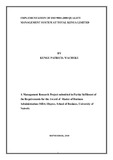| dc.description.abstract | The petroleum industry in Kenya was liberalized in October 1994. This in effect meant removal of government controls and restrictive regulations in the industry while opening the market to competitive forces. This greatly increased competition in the petroleum industry. As a result of increased competition, several major multinational companies have quit the Kenyan market. However, Total Kenya Limited has instead continued to grow and has recently acquired the former Chevron, resulting in a huge current market share of 27.5% in this harsh environment. To remain competitive in this market, the company has implemented several management systems among them ISO 9001 :2008 that ensures that customer satisfaction is achieved through constant evaluation of Quality processes.
The study set out to establish the factors that influence the implementation of ISO 9001 :2008 in Total Kenya Limited and determine the quality practices in the company under study. The study was done through a case study of Total Kenya Limited through an interview guide that was administered face to face to get detailed content from the ISO team. The study found that awareness of the ISO 9001 :2008 quality management system that is in place in the organization is very high. The quality management system in place was found to be working and is achieving product and service quality that meets customer requirement. The company was found to be in the process of getting certification of the ex-Chevron sites certified to ensure the whole organization implements the quality management system.
The main motive for implementing a quality management system was found to improve organizational effectiveness in terms of having a systematic approach to meeting quality and company goals leading to competitive advantage, improved performance and enhanced customer trust and loyalty. It also leads to enhanced image with the regulators. The main challenge noted was the heavy documentation that goes with ISO 9000 documentation requirements with the big size of the company after the merger. The surveillance audits done twice annually are also quite involving in terms of preparation but with enough personnel in the ISO team, this should be okay. For now though, one quality manager still takes care of the implementation of the QMS in the grown firm.
Staff turnover at the service station level also means the organization has to keep on training continuously to ensure that new staffs understand what ISO 9001 :2008 implementations involves. This is quite expensive. The biggest gains the company has achieved through the QMS implementation is more efficient processes, higher product and service quality and increased market share | en_US |

